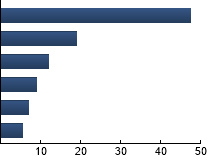Investment Objective/Strategy - The First Trust Nasdaq Cybersecurity ETF is an exchange-traded fund. The Fund seeks investment results that correspond generally to the price and yield (before the Fund's fees and expenses) of an equity index called the Nasdaq CTA Cybersecurity™ Index.
There can be no assurance that the Fund's investment objectives will be achieved.
- The Nasdaq CTA Cybersecurity™ Index is designed to track the performance of companies engaged in the cybersecurity segment of the technology and industrials sectors. It includes companies primarily involved in the building, implementation, and management of security protocols applied to private and public networks, computers, and mobile devices in order to provide protection of the integrity of data and network operations.
- To be included in the index, a security must be listed on an index-eligible global stock exchange and classified as a cybersecurity company as determined by the Consumer Technology Association (CTA).
- Each security must have a worldwide market capitalization of $500 million, have a minimum three-month average daily dollar trading volume of $1 million, and have a minimum free float of 20%.
- The index is evaluated semi-annually in March and September, but if at any time during the year other than the evaluation, an index security no longer meets the eligibility criteria, or is otherwise determined to have become ineligible for inclusion in the index, the security is removed from the index and is not replaced. Any index security that reaches its foreign investment limit between quarterly rebalances is removed from the index.
- The index employs a weighting methodology based on free float market capitalization, which includes caps on the percentage of any individual security to derive the final weights of the securities. No security may be weighted less than 0.25%.
- The index is rebalanced quarterly.
| Ticker | CIBR |
| Fund Type | Cyber Security |
| Investment Advisor | First Trust Advisors L.P. |
| Investor Servicing Agent | Bank of New York Mellon Corp |
| CUSIP | 33734X846 |
| ISIN | US33734X8469 |
| Intraday NAV | CIBRIV |
| Fiscal Year-End | 09/30 |
| Exchange | Nasdaq |
| Inception | 7/6/2015 |
| Inception Price | $20.00 |
| Inception NAV | $20.00 |
| Rebalance Frequency | Quarterly |
| Total Expense Ratio* | 0.59% |
* As of 2/3/2025
The Investment Advisor has implemented fee breakpoints, which reduce the fund's investment management fee at certain assets levels. Please see the fund's Statement of Additional Information for full details.
| Closing NAV1 | $63.43 |
| Closing Market Price2 | $63.39 |
| Bid/Ask Midpoint | $63.37 |
| Bid/Ask Discount | 0.10% |
| 30-Day Median Bid/Ask Spread3 | 0.06% |
| Total Net Assets | $7,925,894,026 |
| Outstanding Shares | 124,950,002 |
| Daily Volume | 1,855,797 |
| Average 30-Day Daily Volume | 964,299 |
| Closing Market Price 52-Week High/Low | $71.92 / $52.10 |
| Closing NAV 52-Week High/Low | $71.84 / $52.11 |
| Number of Holdings (excluding cash) | 32 |
| Holding |
Percent |
| Cisco Systems, Inc. |
7.87% |
| CrowdStrike Holdings, Inc. (Class A) |
7.60% |
| Palo Alto Networks, Inc. |
7.52% |
| Infosys Limited (ADR) |
7.49% |
| Broadcom Inc. |
7.03% |
| Thales S.A. |
5.54% |
| Okta, Inc. |
4.60% |
| Zscaler, Inc. |
4.38% |
| Check Point Software Technologies Ltd. |
4.30% |
| Leidos Holdings, Inc. |
4.28% |
* Excluding cash.
Holdings are subject to change.
Past performance is not indicative of future results.
 Among 243 funds in the Technology category. This fund was rated 4 stars/243 funds (3 years), 4 stars/209 funds (5 years) based on risk adjusted returns.
Among 243 funds in the Technology category. This fund was rated 4 stars/243 funds (3 years), 4 stars/209 funds (5 years) based on risk adjusted returns.
| Maximum Market Cap. | $934,799 |
| Median Market Cap. | $12,780 |
| Minimum Market Cap. | $502 |
| Price/Earnings | 36.98 |
| Price/Book | 7.28 |
| Price/Cash Flow | 27.70 |
| Price/Sales | 4.52 |
|
|
2024 |
Q1 2025 |
Q2 2025 |
Q3 2025 |
| Days Traded at Premium |
163 |
54 |
--- |
--- |
| Days Traded at Discount |
89 |
5 |
--- |
--- |
|
Software
|
47.51%
|
|
IT Services
|
18.89%
|
|
Communications Equipment
|
11.90%
|
|
Professional Services
|
9.11%
|
|
Semiconductors & Semiconductor Equipment
|
7.04%
|
|
Aerospace & Defense
|
5.55%
|
|

|
Tracking Index: Nasdaq CTA Cybersecurity™ Index
| |
Standard Deviation |
Alpha |
Beta |
Sharpe Ratio |
Correlation |
| CIBR |
19.49% |
0.07 |
0.80 |
0.39 |
0.70 |
| S&P Composite 1500® Information Technology Index |
23.03% |
4.13 |
1.23 |
0.68 |
0.90 |
| S&P 500® Index |
16.95% |
--- |
1.00 |
0.55 |
1.00 |
Standard Deviation is a measure of price variability (risk). Alpha is an indication of how much an investment outperforms or underperforms
on a risk-adjusted basis relative to its benchmark.Beta is a measure of price variability relative to the market. Sharpe Ratio is a measure
of excess reward per unit of volatility. Correlation is a measure of the similarity of performance.
S&P Composite 1500® Information Technology Index - The Index is a capitalization-weighted index of companies classified by GICS as information technology within the S&P Composite 1500 Index. S&P 500® Index - The Index is an unmanaged index of 500 companies used to measure large-cap U.S. stock market performance.
|
|